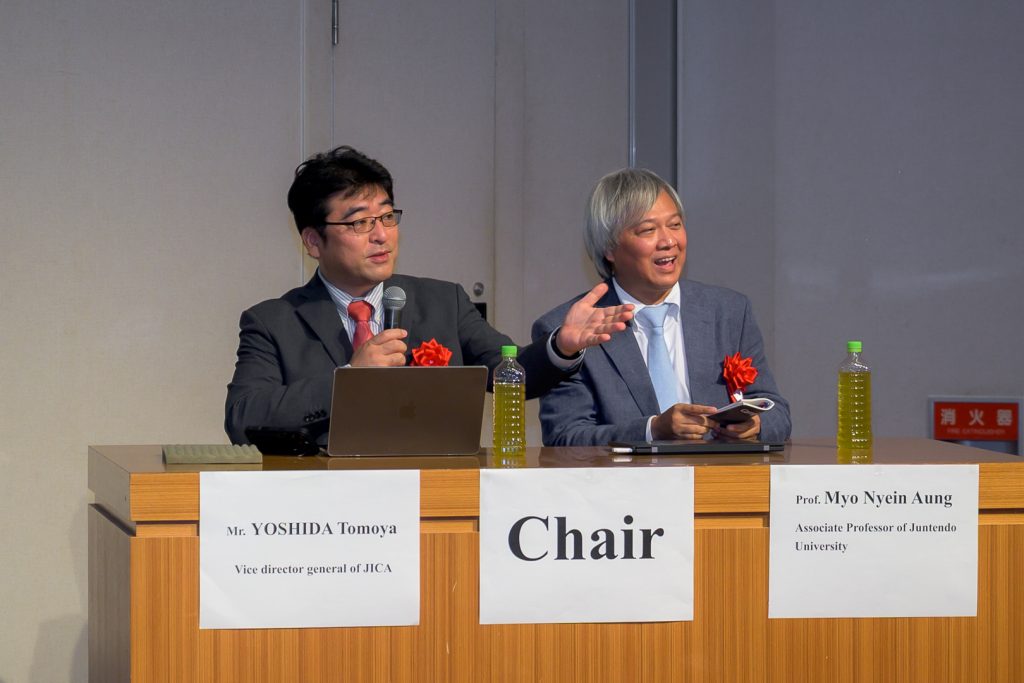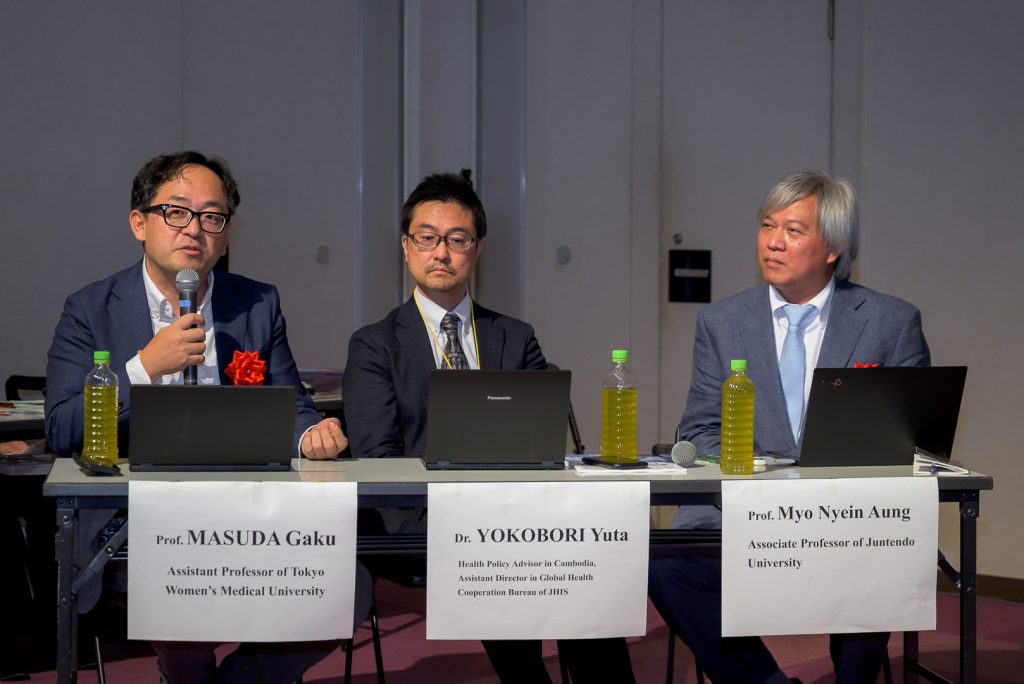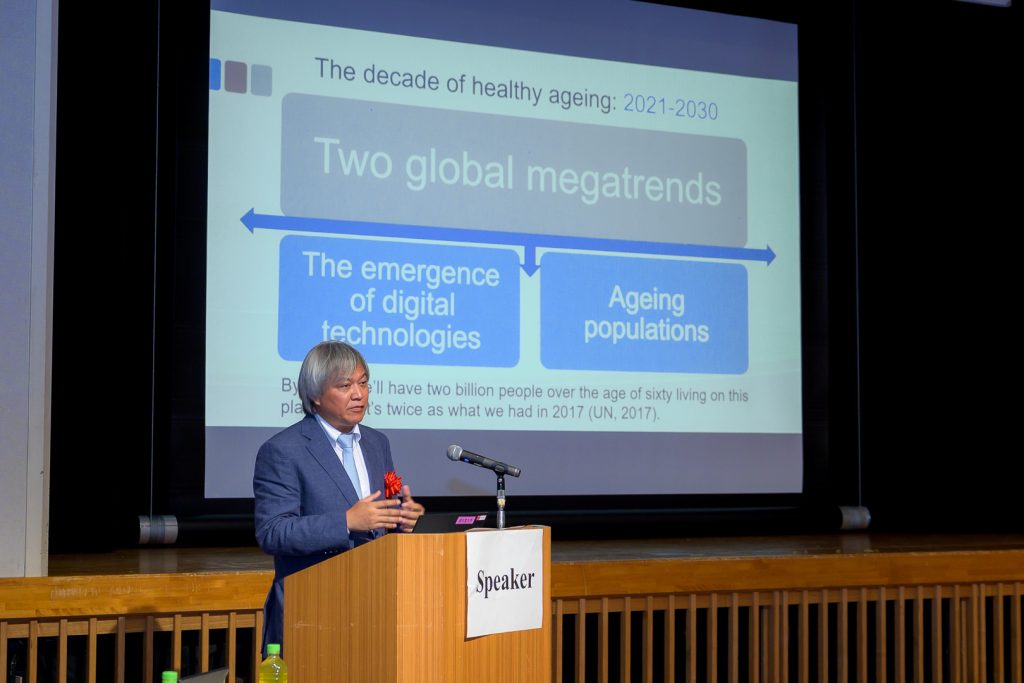DIHAC study contributed a symposium entitled “Near Future Global Health Shaped with Digital Technology” at the 39th East Japan Association of Global Health Conference, Izu
DIHAC study presented at the 39th East Japan Association of Global Health Conference
The findings from the Digitally Inclusive Healthy Ageing Communities (DIHAC) study continue to gain invitations to present at symposiums and conferences across Japan and Asia. On 2025 July 12–13, the Japan Association for Global Health organized the 39th East Regional Conference at Axis Katsuragi Hall in Kona, Izunokuni City, Shizuoka Prefecture, Japan.
DIHAC study PI Associate Professor Myo Nyein Aung and Mr. Tomoya Yoshida, Vice Director General of the Japan International Cooperation Agency (JICA) chaired the symposium entitled “Near Future Global Health Shaped with Digital Technology“.

Fig. 1: Chair of the symposium Mr Yoshida Tomoya and Professor Myo Nyein Aung at the 39th East Japan Association of Global Health Conference on 12th July, 2025
Featured Speakers:
Professor Gaku Masuda – Assistant Professor, Tokyo Women’s Medical University, Section of Global Health
Dr Yuta Yokobori – JICA Cambodia Health Policy Advisor and Medical Doctor, Japan Institute of Health Security
Professor Myo Nyein Aung – DIHAC Study PI, Associate Professor, Department of Global Health Research, Juntendo University Graduate School of Medicine

Fig. 2 Speakers discussing with each other in the Symposium entitled Near Future Global Health Shaped with Digital Technology.
Chairperson Mr. Yoshida gave an opening speech. Professor Masuda presented overview of using new technologies such as AI and drones in global health. He presented his international project using drone technology for diseases control in 3 Southeast Asian countries and in Africa. The research findings and experiences are groundbreaking. Dr. Yokobori presented the conversion of conventional death verbal autopsy procedures to automatic verbal autopsy using digital technology in Cambodia and Africa. The research will help global south for mortality statistics in a new way.
Professor Myo discussed his presentation entitled “Digital Inclusion for Age-friendly Global Health beyond the Healthy Ageing Decade”. The presentation emphasized the role of digital technology in promoting inclusive and sustainable health systems in the era where population ageing and digital technologies are the two global mega-trends. He advocated the digital inclusion of older population. Furthermore, he presented (1) the digital facilitation programs aiming to extend digital literacy of older persons in ROK, Japan, Singapore and Thailand, (2) Good practices of digitally integrated service delivery.

Fig. 3: Professor Myo Nyein Aung, Principal Investigator of the DIHAC study, presenting research findings entitled “Digital Inclusion for Age-Friendly Global Health Beyond the Healthy Ageing Decade” at the 39th East Regional Conference of the Japanese Association for Global Health on July 12, 2025
At the end of three presentation and Q and A sessions, three speakers discussed each other. Moderated panel discussion focused on stakeholder engagement especially dealing with national and local governments in implementing digital technology-based program and intervention in Global Health. The discussion also highlighted digital data integration for ageing, long term care and health care.
In this symposium DIHAC study team submitted an abstract. The abstract was co-authored by a team of ten international professors, global researchers, reflecting the interdisciplinary and cross-cultural nature of the DIHAC study.
Abstract: Digital Inclusion for Age-Friendly Global Health Beyond the Healthy Ageing Decade
Authors and Affiliations:
| Name | Affiliation |
|---|---|
| Myo Nyein Aung (corresponding author) | Associate Professor, Department of Global Health Research, Graduate School of Medicine; Faculty of International Liberal Arts; Advanced Research Institute for Health Sciences, Juntendo University, Tokyo, Japan |
| Eun Woo Nam | Honorable Professor, Department of Health Administration, Software Digital Healthcare Convergence College; Yonsei Global Health Center, Yonsei University, Republic of Korea, Co-PI of DIHAC study |
| Carol Ma Hok Ka | Professor, S R Nathan School of Human Development Singapore University of Social Sciences, Singapore, Co-PI of DIHAC study |
| Yuka Koyanagi | Associate Professor, Department of Judo Therapy, Faculty of Health Sciences, Tokyo Ariake University of Medical Sciences, Japan, Co-PI of DIHAC study |
| Saiyud Moolphate | Lecturer, Department of Public Health, Faculty of Science and Technology, Chiang Mai Rajabhat University, Chiang Mai, Thailand, Co-PI of DIHAC study |
| Nico De Witte | Professor, Vrije Universiteit Brussel & University College Ghent, Belgium; co-founder of Belgium Ageing Studies |
| Michele Bertani | Assistant Professor – PNRR Age-It, Department of Economics, Ca’ Foscari University of Venice, Italy |
| Paul P. Freddolino | Professor, School of Social Work, College of Social Science, Michigan State University, United States |
| Jan A. G. M. van Dijk | Honorable Professor, Department of Communication Science, University of Twente, The Netherlands |
| Motoyuki Yuasa | Professor, Department of Global Health Research, Graduate School of Medicine; Faculty of International Liberal Arts, Juntendo University, Tokyo, Japan |
This symposium marks another milestone in the DIHAC study to foster digitally inclusive, healthy ageing communities through global cross-cultural collaboration. Taking the opportunity to speak to global health society members, DIHAC study findings were shared, and digital inclusion was advocated as important determinant of global health. DIHAC study team acknowledged the chair of the 39th East Japan Regional Conference, Professor Motoyuki Yuasa and the Japanese Association for the Global Health.
